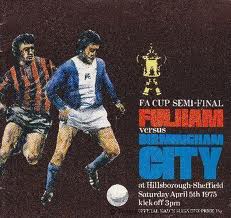Book Review: A Life Well Red – A memoir edged in black – a true story of family, friends & football, of joy and tragedy by Les Jackson
 I confess that I dived straight into this without reading any of the back page. I began to read about a time forgotten but well remembered, a written biography of an ordinary fan, in an ordinary life. It’s all about the value of family, growing up and the attraction that football holds for its community. It felt comfortable and comforting, but after a while I had to ask myself why someone would write this, and a publishing house would publish it, so I consulted the chapter headings.
I confess that I dived straight into this without reading any of the back page. I began to read about a time forgotten but well remembered, a written biography of an ordinary fan, in an ordinary life. It’s all about the value of family, growing up and the attraction that football holds for its community. It felt comfortable and comforting, but after a while I had to ask myself why someone would write this, and a publishing house would publish it, so I consulted the chapter headings.
A single chapter with a single date.
As sense of fear and foreboding dwelled. But it was a Liverpool fan and there are two dates which resonate. Neither chimed with the date in the book. And then I read the back page and discovered why it had been written.
Tom Jackson, Les and San’s eldest boy was murdered in Australia. A red through and through from a red family, this is the story of where he came from and how the sport of football gave him and his family memories that have sustained them and helped others to get through a tragedy that is truly heart-breaking.
I have read better written tales and I have abandoned worst misery memoirs, but by the end of this I knew a Tom who was full of life, dedicated to his club and who was passionately remembered and missed by a loving family. As an emotional tribute from a father, this was clearly – job done.
Though the pandemic gave Les an opportunity to write it, and the reason for putting fingers on keys is tragic, it is not without humour. There are many moments of light relief and when I noted the key to a potential trivia question, no spoilers here, I am using it, I realised not that this was someone who had got over their tragedy, but who had found perspective and was now sharing it. So let me, in that spirit pose another. Which footballing legend was present at three of the biggest tragedies in British football and what were their roles at each? Heysel, Ibrox and Hillsborough. (Answer at the end.)
As a Scot, your relationship with English football can be based upon quite arbitrary decisions. I followed Liverpool for a variety of reasons in the eighties. Firstly, as an Ayrshire man, I was made aware of the Glenbuck man who had revolutionized the fortunes of a second division team he then led to league glory. I still pass both the turn off to the village and the new colourful memorial in Muirkirk to Bill Shankly on a regular basis. Secondly, having watched with awe the development of a young lad from Troon who was clearly destined for bigger things, my interest peaked when we sold Stevie Nicol for a then club record of £300,000 to Liverpool. I was also not too keen on Brian Clough at the time so whilst most of my mates liked Nottingham Forest, I couldn’t stand them.
But such an affinity takes you so far. Having begun the book with a curiosity, where it works best for me is the personal story. I became embroiled, not just in the way in which the football team was followed but the effect it had upon Les and his family. I get the walk round the houses rather than sit and listen to the game on the radio – though I still listen, I get the desire not to miss out on the big games, the, often, ridiculous ways in which you try and make sure you can be where you need to be to hear and see what you want to hear and see too.
Les adds colour to the bigger occasions by the peculiar and personal recollections of what a young child will do to an icing set, John Manning, his arch nemesis at chess, Mr. Matson, the teacher who introduced him to the game, the reason Tim would have been a suitable nickname growing up and the closeness of a club where you could end up in a kickabout with a player – even if he was a blue. It is telling the tale of a time long forgotten by some but treasured by a generation and whilst it is pleasing to read of the years attending a uniformed organization – the Boys Brigade – which does not include any scandal, it serves as more than a piece of social history with which to bore the grandkids. It also reminds us of why the game has such and enduring relationship to us – it mattered, because it was what dominated our lives. It seeped into us not just because there were few alternatives, but because it was there – close to us and accessible.
There are times when the story resonates more – his first match saw Leicester City with Peter Shilton in goal – as was mine, questionable fashion choices around a time when the bombshell of Shankly retiring whilst mine was when Ally MacLeod went to take on Scotland, discovering your child – in his case, Tom – had a potentially dangerous ailment, dermatomyositis – different ailment, same trauma for me, and the Orange Lodge Days which for us in the West Coast of Scotland have an altogether more fiery outcome and significance. But you don’t need to be “of a certain age” to understand or enjoy this. People are coloured in, and the issues are widened out for you to understand. In short, you are taken on a journey where all becomes clear as you are travelling and not awaiting a major reveal at the end of it all.
The Hillsborough section caught my attention most. Les was there, and as he acknowledges there are plenty of other legacy tales which cover the pain and tragedies which unfolded. Justice for the 97 is well served but, as someone who follows English football avidly, the chapter on Hillsborough gave vital context. Why the ground was used, what other semi-finals had been there and why it had become a significant chapter in the book of any year was exactly what has been missing for many football fans. I got it.
 It underlined why the personal stories were so important. What happened can only be understood in the context of what was lost. Not the memories but the expectations that those memories built. You may always have Istanbul, but you knew there was always the opportunity for another one. With new members of the family arriving, there shall be new memories, different and equally valued. But different.
It underlined why the personal stories were so important. What happened can only be understood in the context of what was lost. Not the memories but the expectations that those memories built. You may always have Istanbul, but you knew there was always the opportunity for another one. With new members of the family arriving, there shall be new memories, different and equally valued. But different.
As the story weaves through finding San, his soulmate and Tom’s mum, jobs in various parts of the country the significance of a central part of your life – Anfield becomes increasingly important. It not only centres your week, it holds your entire focus. If all else fails, you can go and collect cups in May…
It is therefore the success that eluded Liverpool which becomes important as much as the success they had. This is a story which is framed around a club but also informs the narrative. If you are expecting a story that takes you season by season, game by game, this is not it. The totality of the effect of the seasons is measured personally and as Dan arrives and Liverpool progress it allows the Disneyland Paris trip, the Barcelona visit and European excursions become about the core reason for writing this – the family.
That family is constantly extended, not just by the inclusion of new close family members but by colleagues and acquaintances who may be able to barbecue better than Les as well as provide the type of support which you wish never to have to rely on but are immensely grateful when it is there.
And then I arrived at the chapter.
23rd of August 2016.
Tom had gone to experience Australia and when there was staying in a hostel. One night he went to the aid of a young woman being attacked. The attacker turned on Tom and of the three, only one survived. It was neither victim of the attacker.
From the message received that he was in hospital, that supportive cast of characters kicked in. Les went to Australia, and after a period of time, brought Tom home. I cannot do justice to the expression of pain dripping from each page nor to the pride felt when Tom was recognised by friends, governments and former schools. There are too many clichés to be avoided over what a parent should expect regarding their children, but here there is genuine emotion well expressed. That the book, near the end talks of how the attacker has now been released and may be walking free back in his home country of France does not send Les into apoplexy but his understated angst. Is. Completely. Clear.
The ending of the book manages the positive and when Les is pontificating on the game, the passion has continued but it does not quite work as well. Les is hobby horsing a bit. I can forgive that. You could forgive much, but to do so would be to treat this as a sympathy review of a piece of work that has true meaning. It’s well written and it tells the tale well. I am glad I got to read it in the end. You should make the effort to do so too.
And as for the trivial question – Sir Kenny Dalglish, Rangers supporter at Ibrox, Liverpool player at Heysel and Liverpool manager at Hillsborough. Small world, right enough…
Donald C Stewart
(Publisher: Independently published. March 2021. Paperback: 296 pages)
 Les Jackson is a husband and father who has been a fan of Liverpool Football Club for as long as he can remember. As have his wife Sandra and children Tom, Dan and Liv.
Les Jackson is a husband and father who has been a fan of Liverpool Football Club for as long as he can remember. As have his wife Sandra and children Tom, Dan and Liv.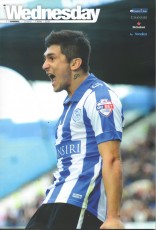 For my last Capital One Cup game at Fulham talk was of how it felt unlike a match-day with a trek across London during rush-hour to witness a game in a ground less than half full.
For my last Capital One Cup game at Fulham talk was of how it felt unlike a match-day with a trek across London during rush-hour to witness a game in a ground less than half full.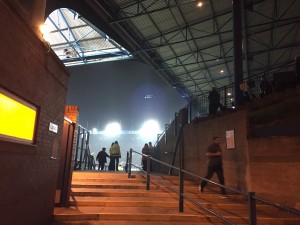 There was a hint of fog in the night sky which swirled in the Hillsborough floodlights and added to the feeling that it might be a night to remember. A quick beer was had and then it was into the Kop, with the crowd, noise and anticipation levels building nicely.
There was a hint of fog in the night sky which swirled in the Hillsborough floodlights and added to the feeling that it might be a night to remember. A quick beer was had and then it was into the Kop, with the crowd, noise and anticipation levels building nicely. Hillsborough was delirious at the half-time whistle with discussions at the break centring on the fact that surely this was a lead that Wednesday couldn’t throw away.
Hillsborough was delirious at the half-time whistle with discussions at the break centring on the fact that surely this was a lead that Wednesday couldn’t throw away. Matt Smith’s second half strike earned a point for Fulham equalising substitute Stevie May’s near post header.
Matt Smith’s second half strike earned a point for Fulham equalising substitute Stevie May’s near post header. It is twenty five years since the Hillsborough disaster and this year saw the beginning of fresh inquests after the original hearings were quashed. Of course the 96 victims who died and the hundreds injured in the tragedy, along with their friends and families have been the ones who have suffered the greatest loss and pain as a result of the events of 15 April 1989 in Sheffield. However, there is also another set of people who have had to deal with what they witnessed that day. These include all those who attended the game that day.
It is twenty five years since the Hillsborough disaster and this year saw the beginning of fresh inquests after the original hearings were quashed. Of course the 96 victims who died and the hundreds injured in the tragedy, along with their friends and families have been the ones who have suffered the greatest loss and pain as a result of the events of 15 April 1989 in Sheffield. However, there is also another set of people who have had to deal with what they witnessed that day. These include all those who attended the game that day.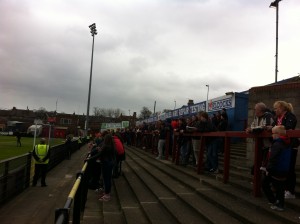 Football is all about routine for fans and this Saturday that seemed to resonant even more than usual as games up and down the country were involved in marking the 25th Anniversary of the Hillsborough tragedy.
Football is all about routine for fans and this Saturday that seemed to resonant even more than usual as games up and down the country were involved in marking the 25th Anniversary of the Hillsborough tragedy. Will the real Sheffield Wednesday ‘stand-up’? That was the question Owls boss Dave Jones was facing after a 2-1 home defeat in the Yorkshire ‘derby’ against Huddersfield Town.
Will the real Sheffield Wednesday ‘stand-up’? That was the question Owls boss Dave Jones was facing after a 2-1 home defeat in the Yorkshire ‘derby’ against Huddersfield Town.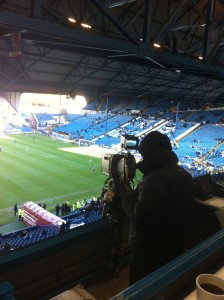 Even with twenty minutes remaining that pretty much sealed the points for Huddersfield, with a goal from a Connor Wickham free-kick three minutes into stoppage time, merely a consolation.
Even with twenty minutes remaining that pretty much sealed the points for Huddersfield, with a goal from a Connor Wickham free-kick three minutes into stoppage time, merely a consolation.